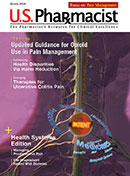US Pharm. 2014;39(11):HS2.
Lubbock, TX—Research conducted at Texas Tech University (TTU) shows that selenium, when attached to the leading clinical chemotherapeutic monoclonal antibody (Mab) for a type of breast cancer, can more effectively kill the cancer cells. About 20% of cells have overexpressed growth receptors (HER2+ receptors) on the cancer cells, which cause uncontrolled cancer growth. Mab treatment, which targets these cells, has proven effective, but often a patient’s cancer develops resistance to the drug. TTU nutritional sciences professor Julian Spallholz, PhD, however, found that selenium, when attached to a Mab presently used to treat breast cancer, has shown greater success in destroying cancer cells in patients who develop resistance to the chemotherapy. The redox technology produced by selenium has other potential applications, noted Dr. Spallholz.
To comment on this article, contact rdavidson@uspharmacist.com.





